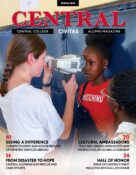
For Central students, being creative is a part of all disciplines.
One of the most widely watched TED Talks is focused on the subject of education. For those not familiar, TED, which stands for Technology, Education and Design, produces brief online video lectures and presentations on a wide range of topics that explore emerging trends, describe interpretive frameworks and challenge conventional wisdom. The popularity of these online videos is a reminder of how much our society craves thoughtful discourse on important topics.
Sir Ken Robinson offered a TED Talk in 2006 entitled, “Do Schools Kill Creativity,” which has been viewed more than 20 million times. He is a noted author and speaker on the subject of education and advises many organizations and governments around the world. His humorous style and quick wit have made him a popular and influential thinker.
Robinson argues we have evolved an educational system that has driven away creativity in service of conformity. In fact, he notes, “We are educating people out of their creative capacities.” In his view, creativity should be as important as literacy in the foundation of our educational efforts as a society.
For some, the concept of creativity is too vague to be of any real use. Robinson’s definition of creativity, however, is helpful:
“Creativity is the process of having original ideas that have value.”
Original ideas, in turn, grow from interactions among academic disciplines, professional fields of study, creative inquiry, encounters with others and experience in practice settings. It sounds a lot like the richness of experience we find in a liberal arts college, particularly Central College.
The diversity of experience we create for our students is among our greatest strengths. I often hear from students as they complete their time at Central that they “can’t believe they got to do so many things.” Societal pressures are seeking to create even more conformity in higher education and less creativity. This is a reality we cannot accept. Our mission is to propel students into a future they have not fully imagined or articulated.
It is also essential we make room for mistakes. Our society has stigmatized mistakes, forcing many to conclude that taking a risk is not worth it. As Robinson puts it, “If you’re not prepared to be wrong, you will never come up with anything original. We must teach our students to be resilient in the face of failure, which inherently requires that they encounter failure along the way.”
In the broader landscape, if we can find a way to break through the tyranny of educational conformity in our society, we can make it possible for the emerging generation of students to tackle the challenges they will invariably find as they age into leadership. Our task will be to educate them into creativity—not out of it—as they will need to find novel solutions to seemingly intractable problems. They need our help to prepare for the future, which will only happen if we have the courage to unleash our own creativity and break the mold of conformity before they fall under its tyranny.












To encourage serious, intellectual discourse on Civitas, please include your first and last name when commenting. Anonymous comments will be removed.
Pingback: Unleashing Our Creativity - Central College